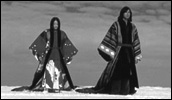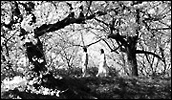Dolls
- Year
- 2002
- Original title
- Dolls
- Japanese title
- Dolls
- Director
- Cast
- Running time
- 113 minutes
- Published
- 25 October 2002



by Andrew Cunningham
Minutes before the lights darkened and Dolls began, I remarked to a Japanese acquaintance that I had yet to read a good thing about this movie. She replied "Oh. But the colors look pretty." A more succinct review you will never hear. Dolls wavers between tedious and laughable, hung against a backdrop designed to remind us that "Beat" Takeshi is not, after all, colorblind.
After a entertaining puppet prologue, the film begins with a striking, but confusing (Kitano seems to be trying to liven up the more boring sections of the film by including inexplicable jump cuts to other sections of the movie) opening in which a couple wander amid the cherry blossoms, tied together by a long red rope. The basic melodrama (man leaves girl for boss's daughter, girl goes mad, man gets girl back but loses job and she's still bonkers) is set up with a brief flurry of bad dialogue and worse acting, and then Kitano falls into a steady pattern of attempting to dignify hopeless melodrama by removing all the dialogue. The wordless scenes with despondent man (Hidetoshi Nishijima from Kiyoshi Kurosawa's License to Live) and insane woman (Tomie's Miho Kanno) echo Hana-Bi, except we don't care and there aren't any jokes.
After Kitano runs out of ideas for what trouble she can get in by wandering off on her own, he ties his leads together and allows them to drift away on a journey that seems partially inspired by Seijun Suzuki's callous disregard for plot in favour of really pretty shot composition. This is presumably why the car gets very dirty, but her hair remains freshly dyed and completely perfect.
Apparently realizing that he cannot expect an audience to sit through an entire movie of beautiful sad people stumbling across amazing locations, (apparently, madness means you can't walk properly) Dolls contains two subplots connected only because the couple happen to walk through them. The first, about a yakuza pining for lost love, almost works, if only because the yakuza (the venerable Tatsuya Mihashi, recently rediscovered through Makoto Shinozaki's Not Forgotten) is the only actor in this who actually bothers acting. A violence filled flashback brings no real insight into the man, and the woman he pines for (1960s Nikkatsu starlet Chieko Matsubara of Tokyo Drifter and Black Tight Killers fame), who has been bringing a lunch to the park every Saturday for forty years in horribly bright lipstick, is less tragic than bone-chillingly frightening.
The second tangent is so completely out of place that I began to wonder if Kitano were actually failing to make a satire, rather than failing to make a melodrama. From interviews with him, it seems he holds characters like these in complete contempt, and it's possible he intended this film to be a brutal slashing of six archetypes he particularly had it in for. If the film is a satire, it's a hopelessly incompetent satire, since no one seems to be able to figure out that it is one. If the film is a melodrama, then it is completely without merit except as some sort of travelogue.
At any rate, the second story is about a blandly beautiful idol singer (Kyoko Fukuda), who performs an incredibly insipid pop number in which the camera movements are far more erotic than those of her hips. This desexualized bubblegum apparently provides everything it needs for creepy loser traffic policeman Nukui (Tsutomu Takeshige), to turn his room into a shrine, in which he dances feverishly to her music surrounded by images of her face. A horrible accident leaves her with only one eye, and, his life no devoid of meaning, he memorizes her face and stabs his own eyes out.
Ultimately, however, both of these storylines end in a completely random and meaningless fashion, and we return to our silent stumbling lovers, as they move into winter and the analogy to this famous puppet theater play becomes more and more heavy-handed. Kitano is a gifted enough filmmaker that even his failures are somewhat fascinating, and I'm sure few people will be able to resist rubbernecking at this road kill despite my words. After all, the colors are pretty. If you get nothing else out of this film, it should be the realization that no trip to Japan is complete without a trip to the Bunraku puppet theater in Osaka, where the tragedy is far more compelling and the acting far more expressive.